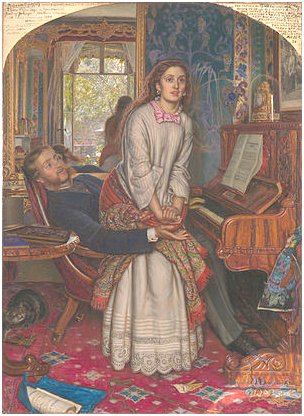In my blog "Fiddlededeeism" I wrote about the paintings Edward Lear was inspired to produce in response to some of Tennyson’s poems. He was also moved to set some of the poems to music. In many ways, this is the highest praise Lear could have offered to Tennyson given that many Victorians believed that music is the language of the soul.
In my blog about Lear’s nonsense poems and drawings I mentioned that he was popular with children wherever he went. He was equally popular with adults. According to Agnus Davidson, in Edward Lear: Landscape Painter and Nonsense Poet, ‘he never lacked an invitation’ to dinner when he was in London (p. 86). His popularity was in part owing to his affable manner, but also to his value as an after-dinner performer. He was almost invariably asked to perform some of his own songs, both settings of his nonsense verse and some of his settings of Tennyson’s poems. Undoubtedly the former brought laughter and many of the latter brought tears. Lear’s performances of settings of Tennyson’s poems were not limited to visits to friends in London; he also performed them for Tennyson at Farringford.
Victorian Drawing-room Ballads
In 1853 Lear published some of his settings of Tennyson’s poems and dedicated the volume to Emily Tennyson. Davidson reports that his settings were charming and ‘show a musical taste that is quite distinguished without the over-sentimentality of the Victorian drawing-room ballad’ (86-87). Lear had very little musical training, making this high praise indeed.
You don’t need to have studied the kinds of drawing-room pieces favoured by the Victorians to understand the cloying sentimentality of many of them, you need only to have read that most Victorian of novels, George Eliot’s Middlemarch. In chapter 12 Mr Featherstone asks Rosamond Vincy to sing ‘Home, Sweet Home’ and ‘Flow on, though shining river’ . He chooses these because he thinks they are appropriate for young ladies; Rosamond detests them for the same reason.
The sentimentality in the songs Rosamond sings would have been produced both by the words in the songs and by their musical settings; the music would be highly ornamental and designed to showcase what a young lady did well without revealing her lack of musical proficiency. In other words, the songs would be pretty without being technically challenging. Lear avoids sentimentality in the words by using Tennyson’s words; that he avoids excessive sentiment in the music is his own success.
Lack of sentimentality, however, does not mean lack of emotional impact. According to Davidson, Lear reports that the Dean of Carlisle (later, Archbishop Tait) ‘“once said, in a big party when I [Lear] had been singing ‘Home they brought her Warrior’ and people were crying: ‘Sir, you ought to have half the Laureateship’”’ (87). The Dean thus implied that Lear’s setting enhanced the emotional effect of Tennyson’s words.
Music and Painting
 Lear’s musical settings of Tennyson’s poems had far reaching effects. His setting of ‘Tears, Idle Tears’, famously, can be seen discarded on the floor in the foreground of William Holman Hunt’s The Awakening Conscience. The painting depicts the moment a mistress tries to escape her lover’s grasp on realising she has wasted her life by becoming a kept woman. The critic Alison Chapman argues that the state in which Lear’s music has fallen on the floor (wrapped in blue paper) suggests she has dropped it ‘in her moment of epiphany’ . I agree with her reading of the image.
Lear’s musical settings of Tennyson’s poems had far reaching effects. His setting of ‘Tears, Idle Tears’, famously, can be seen discarded on the floor in the foreground of William Holman Hunt’s The Awakening Conscience. The painting depicts the moment a mistress tries to escape her lover’s grasp on realising she has wasted her life by becoming a kept woman. The critic Alison Chapman argues that the state in which Lear’s music has fallen on the floor (wrapped in blue paper) suggests she has dropped it ‘in her moment of epiphany’ . I agree with her reading of the image.
It is plausible that the poem’s repetition of the phrase ‘the days that are no more’ would make a kept woman consider her past and all of her lost opportunities. The mistress in the painting has a piano, which suggests she is a reasonably accomplished musician. In reading the words and music in Lear’s setting of the poem she would have imagined how it would sound. And we know from the Dean of Carlisle’s comment that Lear’s music amplifies the passion in Tennyson’s words.
That Hunt used Lear’s music in this way shows that he valued the piece. This implies that Lear’s musical settings of the poems were considered good music in and of themselves, not only when they were performed by such a charming and genial man as Edward Lear.